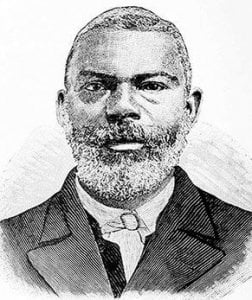BLACK HISTORY MONTH: AMERICA’S FIRST MISSIONARY WAS A FREED SLAVE
SOME DEMOCRATS FEEL MORE ALIENATED THAN EVER
DAVE RAMSEY’S PROVOCATIVE STIMULUS COMMENTS
FED RAISES ALARM ABOUT LABOR MARKET
MEDIA ANCHOR DIDN’T EXPECT THIS TRUTH BOMB…
BLACK HISTORY MONTH: AMERICA’S FIRST MISSIONARY WAS A FREED SLAVE
In honor of Black History Month, we want to share the story of a man you have probably never heard about.
George Liele was the first American, Protestant missionary who brought the gospel to a foreign land. You may have heard that William Carey was the first Baptist missionary. Not so. You may have heard that Adoniram Judson was the first American missionary. Not so. It was George Liele.
 Although born around 1750 to slaves in Virginia, he was sent away from his family to another plantation in Georgia as a young boy. He was blessed to have three godly men in his life, his father, his master, and his pastor. Henry Sharp, Liele’s master, served as a deacon in a Baptist church, pastored by the Reverend Matthew Moore.
Although born around 1750 to slaves in Virginia, he was sent away from his family to another plantation in Georgia as a young boy. He was blessed to have three godly men in his life, his father, his master, and his pastor. Henry Sharp, Liele’s master, served as a deacon in a Baptist church, pastored by the Reverend Matthew Moore.
As a child, Liele innately feared God. He did what was right and avoided sin and bad company because he feared death. He hoped that his good works would earn him salvation. In 1773, at around 23 years of age, Liele came to a saving knowledge of Christ. He said that he realized that his only hope for salvation was the merit of Christ. He asked Christ to have mercy on his “poor immortal soul.”
At the same time as his salvation, Liele did something that would set the course for the rest of his life. In his own words, “I requested of my Lord and Master to give me a work, I did not care how mean (low in value, rank, or status) it was, only to try and see how good I would do it.” His life demonstrates clearly that God answered this humble, surrendered prayer.
Although he had no formal education, Liele was able to read and study the Bible. At the Reverend Moore’s church, the leadership saw that Liele had a passion for God’s Word, so they gave him opportunities to preach. Sharp actually gave Liele his freedom so that he could preach the Gospel.
Liele was ordained May 20, 1775, the first ordained African American pastor in Georgia. He preached all around the area of Savannah, bringing the gospel to the slaves in plantations. In 1783, Liele and his family emigrated to Jamaica. In order to pay the passage for himself, his wife, and four children, Liele became an indentured servant. For two years he worked to pay off this debt, then he was free.
In the words of biographer Edward Holmes, “now free himself, he was filled with compassion for the wretched condition of the slaves.” He spent time understanding their condition and problems. Liele formed a church and preached at the Kingston Race Track. He was a gifted evangelist who joined sound theology with a heart for the lost.
In 1791, Liele’s congregation built a church building. At this time, Liele wrote to Baptist missionary societies asking for support. He was fully bi-vocational, pastoring as well as working as a farmer and keeping a team of horses and wagons for transport of goods. Liele supported his family with his own efforts, and supported the church. His contemporary, Steven Cook, reported that Liele’s diligence and work ethic set an example for all. Additionally, Liele was deeply compassionate about the poverty of his congregation, who as slaves could barely feed themselves: “Out of so small a sum we cannot expect anything that can be of service from them; if we did, it would soon bring scandal upon religion.” In this he also demonstrated his incredible personal integrity.
In Jamaica, Liele and his followers suffered persecution of varying kinds. Meetings and baptisms were disrupted. Once, a man rode his horse into the church and up in front of the pulpit where communion was being celebrated. He demanded, “Come, old Liele, give my horse the Sacrament!” Liele wisely, and courageously answered, “No, Sir, you are not fit yourself to receive it.”
Like many of the other men and women we have studied, Liele valued and pursued freedom of worship for himself and others. In 1791, because of persecution by the planters and the established church in Jamaica, Liele presented the House of Assembly “with a petition of our distresses, being poor people, desiring to worship Almighty God according to the tenets of the Bible; and they have granted us liberty and given us their sanction. Thanks be to God that we have liberty to worship Him as we please in Kingston.” This was not to last.
Slavery was an abomination and slaves wanted to be free. Masters, however, did not want their slaves coming to church or hearing the gospel, for fear that the Christian message of freedom would threaten the system of slavery. It became dangerous for Liele to preach. In 1802 he was imprisoned for preaching sedition. He was put in stocks and not permitted to see his family. Fortunately he was acquitted, for the punishment was death. However, rather than release him, they kept him in prison for the debt due on the church. A law permitted release of an insolvent debtor but Liele stayed until the debt was paid.
In 1805, Jamaica outlawed preaching to slaves. After this, there was terrible persecution—whippings, brutality, sexual abuse, and murder. Yet the numbers of Christians grew. From 1783 to 1791, 500 were baptized. By 1814, there were 8,000 Baptists in Jamaica and in 1832 there were 20,000.
Slavery was legally abolished in all of the British colonies in 1834, six years after Liele’s death. However, it took four more years for the slaves in Jamaica to receive their freedom. Although Liele did not directly challenge the system of slavery, he built the foundation for the abolitionists, thus earning him the title, “Negro slavery’s prophet of deliverance.”
It is fitting to close with the words of this amazing Christ-follower: “I have a right to praise God and glorify Him for the manifold blessings I have received and still do receive from Him. . . . My tongue is not able to express the goodness of the Lord.”
(Photo Credit: Unsplash.)
Please share this story of this remarkable man.
If you like this kind of history, call IFA to receive a copy of the book this is excerpted from: Inspired People. Call 1-800-USA-PRAY (872-7729).
Sources:
Akin, Daniel L. “The Cross and Faithful Ministry As Seen In The Pastoral and Missionary Ministry of George Leile: First Baptist Missionary To The Nations – Galatians 6:11-18.” Chapel sermon, Southeastern Baptist Theological Seminary chapel, 24 August 2010. MP3 audio podcast.
Holmes, Edward A. “George Liele: Negro Slavery’s Prophet of Deliverance.” Baptist Quarterly 20 (October 1964): 340-51, 361; Baptist History and Heritage 1 (August 1965): 27-36.
“Liele, George (c. 1750-1828).” Liele, George (c. 1750-1828) | History of Missiology. Accessed 2017. http://www.bu.edu/missiology/missionary-biography/l-m/liele-george-c-1750-1828/.
Partner with Us
Intercessors for America is the trusted resource for millions of people across the United States committed to praying for our nation. If you have benefited from IFA's resources and community, please consider joining us as a monthly support partner. As a 501(c)3 organization, it's through your support that all this possible.




Comments
This is a Beautiful Testimony and I really enjoyed it! Thank you Sooo Much to sharing it with us!!
GOD BLESS YOU ALL!!
Thank you for this article on Mr. Liele; however, I question the statement ‘he was sent away from his family to another plantation in Georgia as a young boy.’. Is that accurate or should it say he was sold (like chattel)to another plantation? While God used this man tremendously, let’s not side-step the fact he was enslaved in the US and ran up against the same vile spirit in Jamaica.
God,
Our Shepherd, we thank You for teaching and leading those way back. We are so blessed to know that leaders started Jesus Christ’s Mission then too. We are proud to be a part of the movement of Christianity and Black History Month. Savior, allow more Christians come to know You and follow You. Amen
Thank you for this remarkable man’s story. Praying that the slavery of ignorance is erased by others in Holy Spirit’greater work.
This article about George Liele being the FIRST African-American Missionary was a blessing to read.
I enjoy reading stories of Christians who have contributed to the spread of the Gospel.
I have printed a copy so that I can share it with others.
May God continue to use the legacy of George Liele to the people of Jamaica and in the history of America.
Reading this brings to mind what I have found doing volunteer work at two hospital. My great joy is meeting older Christian folks like myself and as it turns out especially older black folks. We were all born and lived in the south in the ’50’s and ’60’s. What is so striking is their love and devotion to our LORD. For myself it is an indescribable blessing, the fellowship, love and joy we find in each other as brothers and sisters in Christ. Each has been a George Liele to me
May our Faithful Lord and Savior richly Bless you and yours. Thank you Jesus.
Amen !
Wonderful and inspiring article.
Holy, Heavenly Father, thank you for the inspiring life of George Liele and all of the missionaries that have selflessly served You in this way. Multiply the fruit of their labor. Be glorified. Bless this land with many more truth seekers and missionaries in this hour for Your glory.
That is one awesome testimony!
I love this story!!!
What an incredible testimony of persevering, adapting, and thriving in the very worst of circumstances! BUT God! Jesus’ love for George Liele and his love for Jesus saw him through. The enemy, through slavery, came to dehumanize; to steal, kill, and destroy John 10:10 But God came and gave George His life and more abundantly! What an encouragement to all desiring to know, walk, and please the Lord!
ThankYou George, for your integrity and faithfulness, Thank You IFA for this word, and ThankYou Jesus for Your Love and Mercy